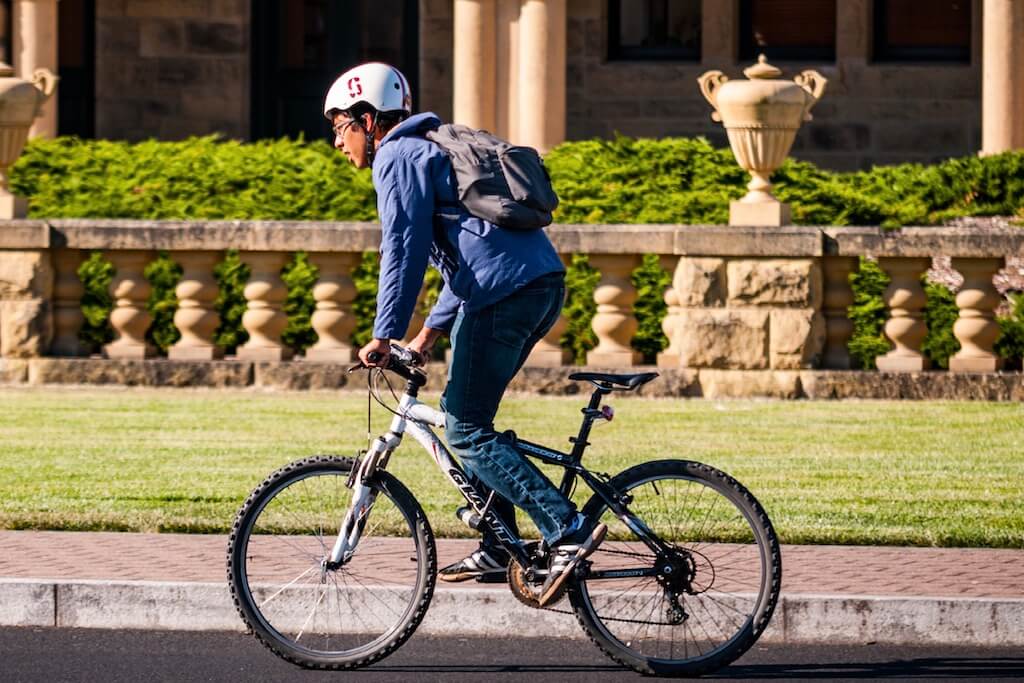Autumn Gear Guide
Find inspiration in our Gear Guide that will keep you out on your bike through wind or rain.
Download NowIn an effort to promote cycling and contribute to safer, more bike-friendly communities, 39 institutes of higher education have been awarded the prestigious Bicycle Friendly University (BFU) certification for 2023, with an additional three institutions receiving Honorable Mentions. This cohort of new and renewing awardees brings the total number of colleges and universities across the […]
In an effort to promote cycling and contribute to safer, more bike-friendly communities, 39 institutes of higher education have been awarded the prestigious Bicycle Friendly University (BFU) certification for 2023, with an additional three institutions receiving Honorable Mentions.
This cohort of new and renewing awardees brings the total number of colleges and universities across the United States dedicated to fostering a cycling culture to 220. The League of American Bicyclists, in collaboration with local advocates, has played a crucial role in empowering these educational institutions to prioritize cycling accessibility.
“Institutes of higher education are key to unlocking the future of safe streets for everyone,” said Bill Nesper, the executive director of the League of American Bicyclists (LAB). “Today’s students are the next generation of leaders, advocates, engineers, scholars, and innovators. By fostering an environment that promotes safe and accessible cycling, not only for students but also for staff and faculty, we’re investing in a future that is more welcoming to all people who bike.”
The 2023 BFU awardees represent a wide range of campus sizes, from the smallest school with a student population of just 402 to the largest with a staggering 74,829 students. This diversity underscores that improvements in campus bikeability can be effectively achieved across various institutions, regardless of size, with schools of all magnitudes leading the way in enhancing bicycling experiences within their communities.
One trend in this round of awards, according to LAB, is the increasing number of platinum-level bicycle friendly universities, the highest and most prestigious award level. Renewing their Platinum BFU awards are Stanford University, Colorado State University, University of California, Irvine, University of California, Santa Barbara, and University of Wisconsin – Madison. Additionally, Boise State University moved up from Gold to Platinum, contributing to a total of six Platinum awards in this round.
The rise in higher BFU award levels reflects the growing commitment of universities and colleges nationwide to invest in better bicycling. These efforts have far-reaching effects, as each campus is an integral part of a larger community. Universities with higher award levels often collaborate with local advocates, businesses, city officials, and the League itself to create a safer, more bike-friendly environment both on and off campus.

Stanford (photo: Stanford Transportation)
“We have identified being bicycle friendly as critical to our success as a growing institution. As new education buildings and residence halls are constructed, parking is further reduced,” wrote new Platinum-level Boise State University in Boise, Idaho. “Bicycles, and the rest of our active transportation suite that even extends to the county highway district and regional bus system, is the answer to future growth.”
Despite the enthusiasm for the future, the impact of the Covid-19 pandemic continues to affect the efforts of universities. This is especially true for renewing BFUs, as their applications were last submitted before the pandemic and therefore reflect multiple years of data from a challenging time. Many campus bike programs experienced setbacks, including reduced funding, staff shortages, and stalled momentum, making it difficult to measure progress and secure ongoing support for desired bike-friendly improvements.
Miami University in Oxford, Ohio, a renewing Bronze-level BFU, expressed its determination to rekindle the pre-Covid enthusiasm for promoting a bicycle culture on campus. The school noted, “Covid was a major hindrance in the ongoing improvement of bicycle facilities on campus and has delayed advancement of related infrastructure.”
In response to these challenges, many colleges and universities have adopted innovative approaches to recover and enhance their bicycle-friendly initiatives. Some have created new staff positions to fill leadership gaps left by the pandemic.
James Madison University in Harrisonburg, Virginia, which recently upgraded to Silver-level status, established the position of Alternative Transportation Manager. This role is dedicated to encouraging students, faculty, and staff to use more sustainable transportation methods. In its application, the school wrote, “The ATM has made great progress in her first year on staff and looks forward to continuing to make JMU the best Bicycle Friendly University possible.”
The 39 new and renewing bicycle friendly universities for 2023 demonstrate the growing commitment of higher education institutions to promote cycling and create safer, more bike-friendly communities. Here is the full list.
Find inspiration in our Gear Guide that will keep you out on your bike through wind or rain.
Download Now
Leave a comment